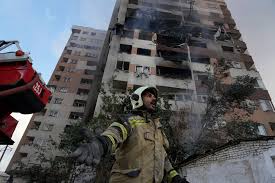‘Narrowly escaped missile barrage’: Kerala duo describe fleeing Tehran with local family amid Israel-Iran conflict

Tehran/Thiruvananthapuram — As tensions escalated between Israel and Iran, two Indian nationals from Kerala found themselves caught in the heart of a missile exchange in Tehran. Recounting their traumatic experience after returning to India, the duo described how they narrowly escaped what could have been a deadly encounter during the surprise military confrontation.
A Routine Trip Turned Nightmare
For Thrissur-based businessman Anoop Kurian (34) and his friend Mahesh Varghese (31), what began as a week-long business visit to Iran ended with a desperate dash to safety. The two had landed in Tehran for meetings with a local textile supplier just days before the conflict intensified.
Speaking to media after landing at Kochi International Airport, Anoop said, “We knew the region was tense, but we never expected to witness actual missile strikes. We heard air sirens and loud blasts. We were staying at a friend’s place in central Tehran, and it was terrifying.”
Escaping Amid Sirens and Explosions
The missile barrage began late at night. According to Mahesh, they were having dinner with their host, an Iranian family who had worked with them on several textile deals in the past. Suddenly, the city was shaken by explosions and the wailing of air raid sirens.
“The first sound was like thunder but deeper. Then came the second, third, and fourth — by then, we knew it was a strike,” Mahesh said. “The Iranian family immediately rushed us to their underground garage, which they had converted into a makeshift shelter.”
The duo remained there for hours, relying on local radio and WhatsApp updates from Indian embassy contacts. “The ground trembled. You could hear things falling outside,” Anoop recalled.
A Rush to the Airport
With no guarantee that the situation would stabilize, the Indian embassy in Tehran issued an emergency advisory urging citizens to stay indoors and prepare for possible evacuation. Anoop and Mahesh, with help from their Iranian hosts, managed to reach Imam Khomeini International Airport the next morning.
“The roads were chaotic. There were military vehicles everywhere. It felt like a war zone,” Anoop said.
Though commercial flights were limited, the Indian embassy coordinated with local authorities to ensure safe passage for citizens. The duo was among a group of Indians flown out to Dubai before connecting to Kochi.
Thankful, Yet Traumatized
The experience has left both men shaken. Mahesh said he still wakes up in the middle of the night, startled by loud sounds. “We’re lucky to be alive. Not everyone is. We owe a lot to that Iranian family. They protected us like their own,” he said.
Both have called for better alert systems and travel advisories for Indians abroad, especially in conflict-prone regions. “We were not adequately warned. I hope our government updates travel alerts more aggressively during such times,” Anoop added.
India’s Response to the Crisis
India has maintained a neutral stance on the Israel-Iran conflict but has expressed concern over the escalation. The Ministry of External Affairs (MEA) issued a statement urging restraint from both sides and called for diplomatic resolution.
Following reports of missile attacks affecting civilian areas in Iran, the Indian Embassy in Tehran activated its emergency helpline and began registering citizens who wanted to leave the country. Over 50 Indians were evacuated over the following 48 hours.
Rising Global Concerns
The missile exchange between Israel and Iran marked one of the most dangerous developments in the Middle East in recent years. Though both nations have had longstanding hostilities, open military confrontation has largely been limited to proxy engagements.
This direct exchange of fire has raised fears of a broader regional conflict, with global powers like the United States, Russia, and China closely monitoring the developments. The United Nations has urged both nations to “de-escalate immediately to prevent civilian casualties and regional destabilization.”
Kerala Government Steps In
Back in India, Kerala Chief Minister Pinarayi Vijayan praised the quick actions of the Indian Embassy and assured support to all citizens from the state who were affected. “We are proud of the resilience shown by our people. We are also grateful to the diplomatic officials who ensured their safe return,” he said in a statement.
The Kerala Non-Resident Keralites Affairs (NORKA) department has also set up a helpline for families trying to contact relatives in Iran.
Lessons from the Escape
The incident has shed light on the growing risks for Indian citizens working or traveling in volatile regions. Anoop and Mahesh are now urging the Indian government to strengthen diplomatic support systems and communication channels abroad.
“Indian citizens working in the Gulf or visiting nearby countries should have quicker access to emergency exits and embassy coordination,” said Mahesh.
Their story stands as a reminder of how fast a peaceful visit can turn into a battle for survival in geopolitically sensitive zones.






